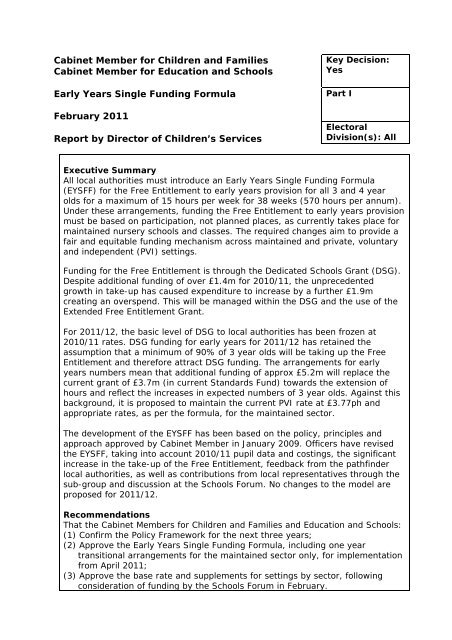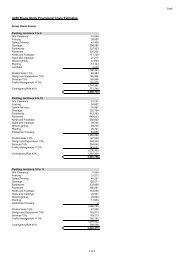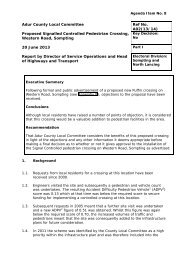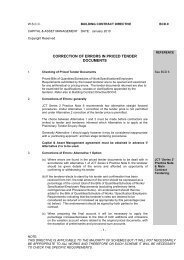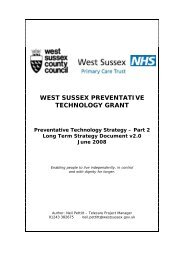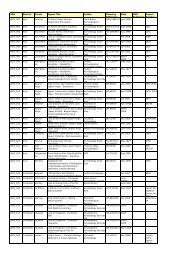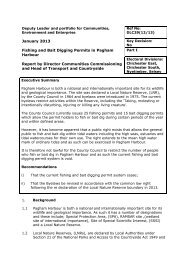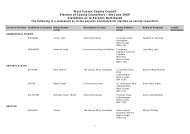Early Years Single Funding Formula - West Sussex County Council
Early Years Single Funding Formula - West Sussex County Council
Early Years Single Funding Formula - West Sussex County Council
You also want an ePaper? Increase the reach of your titles
YUMPU automatically turns print PDFs into web optimized ePapers that Google loves.
Cabinet Member for Children and FamiliesCabinet Member for Education and Schools<strong>Early</strong> <strong>Years</strong> <strong>Single</strong> <strong>Funding</strong> <strong>Formula</strong>February 2011Report by Director of Children’s ServicesKey Decision:YesPart IElectoralDivision(s): AllExecutive SummaryAll local authorities must introduce an <strong>Early</strong> <strong>Years</strong> <strong>Single</strong> <strong>Funding</strong> <strong>Formula</strong>(EYSFF) for the Free Entitlement to early years provision for all 3 and 4 yearolds for a maximum of 15 hours per week for 38 weeks (570 hours per annum).Under these arrangements, funding the Free Entitlement to early years provisionmust be based on participation, not planned places, as currently takes place formaintained nursery schools and classes. The required changes aim to provide afair and equitable funding mechanism across maintained and private, voluntaryand independent (PVI) settings.<strong>Funding</strong> for the Free Entitlement is through the Dedicated Schools Grant (DSG).Despite additional funding of over £1.4m for 2010/11, the unprecedentedgrowth in take-up has caused expenditure to increase by a further £1.9mcreating an overspend. This will be managed within the DSG and the use of theExtended Free Entitlement Grant.For 2011/12, the basic level of DSG to local authorities has been frozen at2010/11 rates. DSG funding for early years for 2011/12 has retained theassumption that a minimum of 90% of 3 year olds will be taking up the FreeEntitlement and therefore attract DSG funding. The arrangements for earlyyears numbers mean that additional funding of approx £5.2m will replace thecurrent grant of £3.7m (in current Standards Fund) towards the extension ofhours and reflect the increases in expected numbers of 3 year olds. Against thisbackground, it is proposed to maintain the current PVI rate at £3.77ph andappropriate rates, as per the formula, for the maintained sector.The development of the EYSFF has been based on the policy, principles andapproach approved by Cabinet Member in January 2009. Officers have revisedthe EYSFF, taking into account 2010/11 pupil data and costings, the significantincrease in the take-up of the Free Entitlement, feedback from the pathfinderlocal authorities, as well as contributions from local representatives through thesub-group and discussion at the Schools Forum. No changes to the model areproposed for 2011/12.RecommendationsThat the Cabinet Members for Children and Families and Education and Schools:(1) Confirm the Policy Framework for the next three years;(2) Approve the <strong>Early</strong> <strong>Years</strong> <strong>Single</strong> <strong>Funding</strong> <strong>Formula</strong>, including one yeartransitional arrangements for the maintained sector only, for implementationfrom April 2011;(3) Approve the base rate and supplements for settings by sector, followingconsideration of funding by the Schools Forum in February.
1. Background1.1 In April 2011 all local authorities must introduce an <strong>Early</strong> <strong>Years</strong> <strong>Single</strong><strong>Funding</strong> <strong>Formula</strong> (EYSFF) for the Free Entitlement to early years provision forall 3 and 4 year olds. The Free Entitlement (for a maximum of 15 hours pwfor 38 weeks - 570 hours per annum) is offered through maintained nurseryschools and nursery classes, private, voluntary and independent (PVI)settings, including childminders in an approved network.1.2 The breakdown of provision (and percentage of children served) in <strong>West</strong><strong>Sussex</strong> in 2010 is as follows: 4 Maintained Nursery Schools (4%), 13 NurseryClasses attached to schools (4.3%) and 430 PVI providers (91.7%). Althoughthere are different legal requirements in respect of staffing andaccommodation, both sectors are required to meet the standards outlined inthe <strong>Early</strong> <strong>Years</strong> Foundation Stage framework.1.3 <strong>Funding</strong> for the Free Entitlement is through the Dedicated Schools Grant(DSG). The level of DSG funding for 2011/12 has retained the assumptionthat a minimum of 90% of 3 year olds will presumed to be taking up the FreeEntitlement and therefore attract DSG funding. Under the new arrangements,the funding of the Free Entitlement to early years provision must be basedon participation, not planned places, as currently takes place for maintainednursery schools and classes. The required changes in the funding formulaaim to provide a fair and equitable funding mechanism across settings in themaintained and PVI sectors.2. <strong>West</strong> <strong>Sussex</strong> <strong>Early</strong> <strong>Years</strong> <strong>Single</strong> <strong>Funding</strong> <strong>Formula</strong>2.1 The EYSFF is based on the policy, principles and approach approved byCabinet Member (Children and Young People’s Services) in January 2009.2.2 The model agreed consists of a base rate and a small number of supplementsonly to provide as much financial stability as possible for settings. The baserate takes into account all core costs, primarily staffing (based on requiredqualifications, terms and conditions of service and ratios) and premises bytype of provision. Two supplements only were confirmed: i) deprivation(mandatory) and ii) London weighting (Crawley). Given the deferred date ofimplementation in <strong>West</strong> <strong>Sussex</strong>, no changes to the policy framework areproposed at this time.2.3 In line with national requirements, the EYSFF is based on typical costsmodels for the maintained and PVI sectors respectively. For the PVI sectorthe typical costs model has been developed following two surveys and ananalysis of fees. For the maintained sector, the typical costs model has beenbased on funding data from the local authority and significant detaileddiscussion, particularly with the four maintained nursery schools, to ensureall unavoidable costs have been taken into account. These unavoidable costsare higher in the maintained sector, particularly as a result of the legalrequirement for a qualified teacher for each group of 26 children.2.4 Against a background of a frozen settlement for schools, it is proposed tomaintain the current PVI rate at £3.77 per hour. This means the level of base
ate by sector and provision is as follows:SectorsettingBase rateper hourper childPVIsettingsNurseryclasses3 classmaintainednurseryschool2.5 classmaintainednurseryschool£3.77 £3.94 £4.09 £4.14 £4.212 classmaintainednurseryschool2.5 Following a comparison with other local authorities, <strong>West</strong> <strong>Sussex</strong> is broadly inline and generally more favourable. However, in view of the complexities, itis difficult to compare accurately as local authorities have constructed verydifferent formulae.3. Consultation3.1 The key partners in the development of the EYSFF are maintained and PVIearly years providers. In <strong>West</strong> <strong>Sussex</strong> this has been taken forward through asub-group of the Schools Forum, with 3 representatives from the maintainedand Private, Voluntary and Independent sectors respectively. The sub-groupis supported by officers from Financial Services, Learning Service and <strong>Early</strong>Childhood Service of the <strong>County</strong> <strong>Council</strong>.3.2 All early years providers offering the Free Entitlement were consulted inOctober 2009. Officers have reviewed and revised the EYSFF, taking intoaccount feedback from the consultation, the pathfinder local authorities andin consultation with local sector representatives, including governors througha range of meetings over the development period.3.3 The EYSFF is compliant with regulations and reflects sector differences. It isacknowledged that the rate of funding is not at the level desired by both themaintained and PVI sectors. In the current financial climate and pressures onDSG, retaining the level of funding for the PVI sector is considered importantto maintain stability for this sector. For the maintained sector, thetransitional funding arrangements will help manage the required operationalchanges.3.4 The latest meeting with the wider PVI sector held in February 2011 confirmedconcerns regarding the level of funding, but representatives welcomed theproposal to maintain the current rate. The confirmation of additional fundingfrom the Graduate Leader Fund to support qualifications of staff wasrecognised as critical to maintain and improve the quality of provision.Should this be removed in the future, this could impact negatively onoutcomes for children and also the sustainability of provision. Therepresentatives present confirmed their commitment to the scheme andappreciated the work of WSCC officers given the difficult financial constraintsat this time.3.5 The EYSFF has been discussed fully throughout the development processwith the Cabinet Members for Education and Schools and for Children andFamilies.
3.6 Although the introduction of the EYSFF from April should not have any impacton parents’ ability to access the Free Entitlement to early years provision fortheir children, a letter outlining the changes in funding will be issued toparents via all settings.4. Customer Focus Appraisal4.1 A Customer Focus Appraisal has been undertaken and is attached as anAppendix to this report.5. Resource Implications and Value for Money5.1 It is acknowledged that a formulaic approach by its nature will not providethe full costs for some and a higher level of funding for others, and that themove from planned places to actual take-up will result in a significantreduction in the level of funding for maintained nursery schools in particular.5.2 Despite additional funding of over £1.4m for 2010/11, the unprecedentedgrowth in take-up has caused expenditure to increase by a further £1.9mcreating an overspend which will be managed within the DSG and the use ofthe Extended Free Entitlement Grant. This is considered to be due to an increase in numbers of 3 and 4 year old population; an increase in take-up of hours following the extension of 15 hours and the increased flexibility available to parents.5.3 Projected costings for the Free Entitlement have previously used health data(live births) from the Central Education Database. However, in light of thesignificant increase in the take-up of the Free Entitlement, modelling of theproposed EYSFF has used actual take-up data from the Autumn Term 2010,with an assumed increase in line with this data for Spring and SummerTerms 2011. As we are yet to see the full impact of the increase to 15 hoursfrom September 2010, assumptions have been made from the data availableregarding the impact of parental preferences in take-up of the FreeEntitlement, the number of hours taken up and date of a child’s admission toschool.5.4 The basic level of DSG to local authorities has been frozen at 2010/11 rates.The new arrangements for early years numbers mean that additional fundingof approx £5.2m will replace the current grant of £3.7m (in currentStandards Fund) towards the extension of hours and reflect the increases inexpected numbers of 3 year olds. It is estimated that, at the proposedpayment levels, funding of £24.5m will be required. A contingency of £400khas been retained should take-up increase above expected numbers. Takeupwill be reviewed in the Autumn Term.5.5 The policy and development of the EYSFF relates to the SustainableCommunity Strategy, the <strong>County</strong> Strategy and the Corporate Plan, seeking toensure opportunity for all through the development of high quality,accessible and sustainable early years provision across <strong>West</strong> <strong>Sussex</strong>. Itrecognises the particular issues for rural areas and takes into account newhousing developments. It also seeks to develop stronger communities,developing sustainable services in partnership with the PVI sector which inturn will support economic growth in the county by enabling parents/carersto remain in work. A sustainability appraisal has been completed.
5.6 There is significant evidence (for example Effective Provision of Pre-schoolEducation (EPPE) research) that high quality early years provision bringsmany benefits for young children and for their future achievement at schooland in adult life, particularly for those in disadvantaged areas. <strong>West</strong> <strong>Sussex</strong><strong>County</strong> <strong>Council</strong> has confirmed its commitment in the Children and YoungPeople’s Plan 2010-15 to giving every child the best start in life throughaccess to high quality, accessible, effective, efficient universal services thatprovide good value for money. This work also links to the corporate priority -Think Family: <strong>Early</strong> Intervention and Family Support.6. Risk Management Implications6.1 The implementation of the EYSFF is required from April 2011. <strong>Funding</strong> for themaintained sector is based on legal requirements and unavoidable costs.However, maintained nursery schools and some classes will face significantreduction in funding owing to the pupil count allocation process and therequired removal of planned-places. Discussions have been held with themaintained sector to support them to operate differently and more flexibly ifthe provision is to be sustained. Any staffing implications, including possibleredundancies, are being considered.6.2 Concerns have been raised on the possible impact on quality within themaintained sector, given the potential reduction of qualified teachers due tothe loss of funding. The number of teachers is compliant with legalrequirements. Effective leadership and management will be critical to supportstaff teams to maintain excellent practice. Alternative sources of funding willbe explored to enable outstanding settings to fulfil the role of sharing goodpractice.6.3 Concerns have been expressed by the maintained and PVI sectors that theproposed level of funding under the new model is not sufficient and somesettings may close or withdraw from the scheme. To date there is noevidence of this within the PVI sector and providers attending a recentmeeting have confirmed their on-going commitment to work with WSCC.However, the number and range of places will continue to be monitored byofficers under its duty to secure sufficient early years and childcare places,ensuring diversity of provision and choice for parents.7. Crime and Disorder Act ImplicationsNot applicable8. Human Rights Act ImplicationsNot applicableStuart GallimoreDirector of Children’s ServicesContact: Marilyn Barton Principal Manager – <strong>Early</strong> ChildhoodBackground PapersSustainability Appraisal


